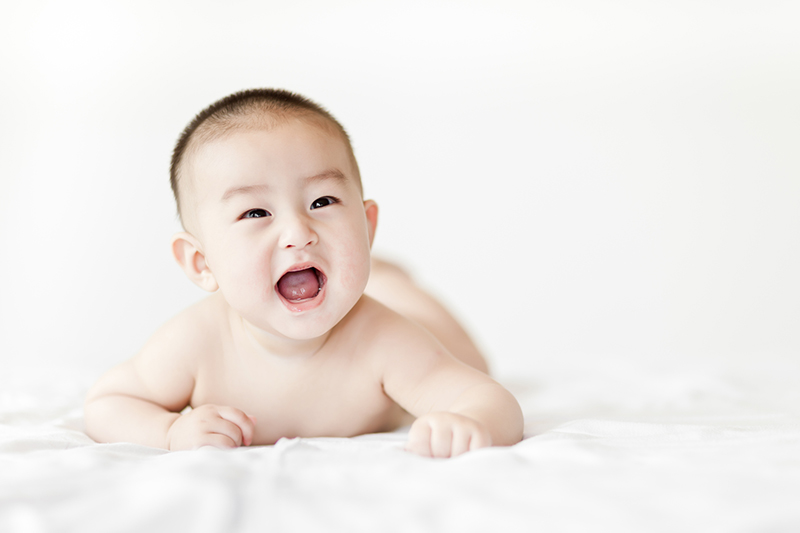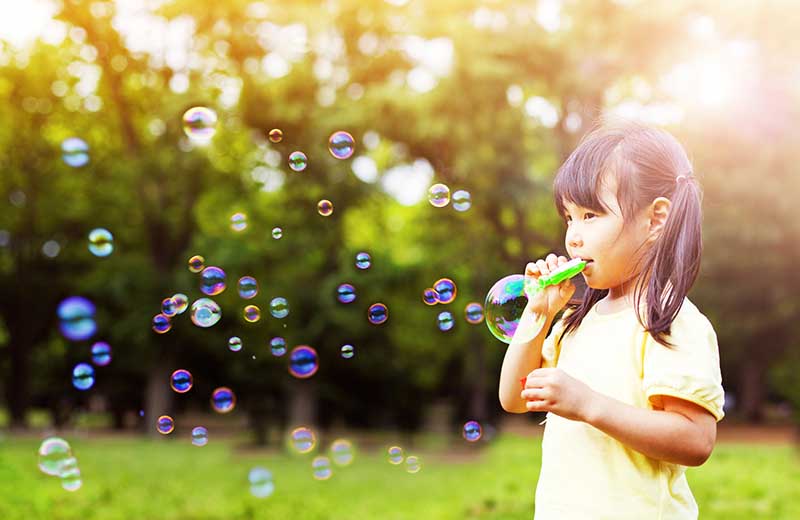Families For Life | 7-8 Months: Baby Development

Babies come in all shapes and sizes, but baby development at 7-8 months typically has a few things in common. Here’s what your baby might be doing, how you can help and when to see a child health professional.
Baby development at 7-8 months: What’s happening
Around this time your baby starts working out how to learn more about their world. For example, your baby looks closely at objects, bangs blocks together, looks for things that they’ve dropped, and tries to find toys after seeing them hidden. Your baby still puts most things into their mouth too.
Your baby is getting a lot of practice at picking up things. And by around 7 months, your baby will have well-coordinated eye-hand movements. This means they can use their fingers to catch and drag objects towards them.
Crawling, rolling or shuffling are all ways your baby might be moving around. Your baby can sit on their own and might also pull themselves up onto their knees or even onto their feet to stand.
At this age, your baby loves playing with you and really enjoys playing peekaboo, ringing bells and finding toys. Copying what you do and making funny sounds or animal noises together with you is a lot of fun for your baby. Playing with you also helps your baby feel loved and secure.
Your baby is babbling. Your baby might babble the same sounds and loudly. And your baby’s babbling might even have up and down tones that sound almost like talking. And if your baby is an early talker, you might hear them say 1-2 words like ‘mama’ or ‘dada’, but they won’t know what these words mean. You might also notice that your baby tries to respond when you call their name.
Most babies are still also using body language to communicate at this age. For example, your baby might reach their hands out to you to say they want to play.
Your baby’s emotions are developing, and your baby lets you know when they're happy or upset. Your baby might show strong attachment to you and other close family members or carers, but they're still a bit afraid of new faces. This might show up as separation anxiety and
fear of strangers, which are typical parts of children’s development around this age.
At this age your baby might also:
try to chew, which means they’re now ready for food mashed or minced into small pieces
try to feed themselves – for example, by picking up their food or holding a drink bottle by themselves
like to explore books, especially brightly coloured ones, by looking at them, touching them, or trying to chew their corners
look for family members if you ask them to – for example, if you say, ‘Where’s Mummy?’, your baby might look around for their mother
stand with help.
You’ll be surprised at how far your baby can roll and crawl, so always watch your baby and never leave them unattended on a sofa, change table or bed. Now is a good time to look at making your home safe for your baby to move around in.
Helping baby development at 7-8 months
Here are a few simple things you can do to help your baby’s development at this age:
Talk to your baby: you can help your baby understand what words mean by chatting as you do everyday activities like bathing your baby or changing nappies. Your baby is interested in conversation, so the more talk the better!
Listen and respond to your baby’s babbling: this builds language, communication and literacy skills, and it helps your baby feel ‘heard’, loved and valued. Responding by talking or making sounds in your own warm and loving way is important. Your baby enjoys hearing your voice go up and down and loves watching your face as you talk to them.
Read together: you can develop your baby’s imagination by reading, talking about pictures in books and telling stories. These activities also build the skills your baby needs to understand language.Introduce new foods: you could give your baby homemade foods like ground-up meats, whole rice or soft bread. Just make sure the solids are small and mushy enough to prevent choking. You could also introduce cereal softened with water, expressed breastmilk, formula or a little bit of full-cream pasteurised cow's milk. But at this age breastmilk or formula should still be baby's main source of nutrition.
Spend time playing outdoors: being out and about with you gives your baby many different experiences – there’s so much to see, smell, hear and touch. When you’re out outside, remember to be safe in the sun.
Prepare your home for a moving baby: It’s a good idea to look at how you can make your home safe for baby to move about in.
Sometimes your baby won’t want to do some of these things – for example, they might be too tired or hungry. Your baby will use special baby cues to let you know when they've had enough and what they need.
Parenting an eight-month-old
As a parent, you’re always learning. It’s okay to feel confident about what you know. And it’s okay to admit you don’t know something and ask questions or get help.
It’s also important to look after yourself. Looking after yourself physically, mentally and emotionally is good for you, and it’s good for your baby. When you’re well, you can give your baby the loving attention they need to grow and thrive.
And remember that part of looking after yourself is asking for help, especially if you’re feeling stressed, anxious or angry. There are many people who can support you and your baby, including your spouse, friends, relatives and General Practitioner.
Never shake a baby. It can cause bleeding inside the brain and likely permanent brain damage.
When to be concerned about baby development
See your paediatrician or General Practitioner (GP) if you have any concerns or notice that your eight-month-old is having any of the following issues.
Seeing, hearing and communicating
Your baby:
isn’t making eye contact with you,
isn’t following moving objects with their eyes
has an eye that is turned in or out most of the time
isn’t babbling
isn’t turning their head towards sounds or voices.
Behaviour
Your baby:
isn't smiling
doesn't show whether they're happy or sad
shows little or no affection for carers – for example, your baby doesn't smile at you.
Movement
Your baby:
isn’t rolling
feels very floppy or stiff
can’t sit up or stand up with your help
uses one hand a lot more than the other.
has difficulty eating solid foods
You should also see a health professional if you notice that your baby has lost skills that they once had.
You should also see your paediatrician or General Practitioner if you notice the signs of postnatal depression in women or postnatal depression in men in yourself or your spouse. Symptoms of postnatal depression include feeling sad and crying for no obvious reason, feeling irritable, having difficulty coping and feeling very anxious.
Baby development issues
All babies develop in the same order but at different rates. There are signs that can tell you that a baby might be experiencing a delay in development. If you’re worried about your baby’s development, it’s a very good idea to have your child checked out by your General Practitioner or paediatrician.
Developmental delay in babies
If you’re worried about your baby’s development or you suspect a delay in development, you should talk with your General Practitioner or paediatrician. There’s no need to feel embarrassed if you're worried about your baby.
Children grow and develop at different speeds. If you’re worried about whether your child’s development is ‘normal’, it might help to know that ‘normal’ varies a lot. But if you still feel that something isn’t quite right, see your paediatrician or General Practitioner.
Video: Language Development: Tips and Milestones
Watch this video and learn the importance of communicating with your baby, and how it helps her learn language.
Video: Skills Learnt Through Play
Watch this video and learn tips on how to guide your little one through play.
© raisingchildren.net.au, translated and adapted with permission
Explore more

DID YOU KNOW?
Play is a great relationship builder. Spending time playing with your child sends a simple message – you are important to me. Help your child learn about who she is and where she fits in the world.
READ MORE